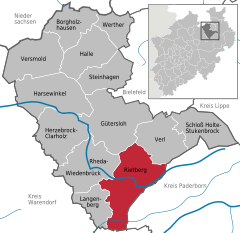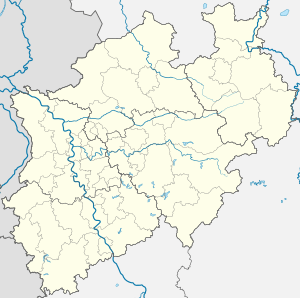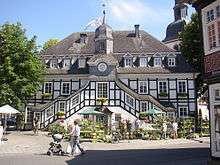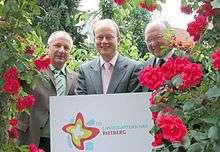Rietberg
Rietberg (German: [ˈʁiːtˌbɛʁk] (![]()
Rietberg | |
|---|---|
 Rietberg town centre, 2005 | |
 Flag  Coat of arms | |
Location of Rietberg within Gütersloh district   | |
 Rietberg  Rietberg | |
| Coordinates: 51°48′N 8°26′E | |
| Country | Germany |
| State | North Rhine-Westphalia |
| Admin. region | Detmold |
| District | Gütersloh |
| Subdivisions | 7 |
| Government | |
| • Mayor | Andreas Sunder (FW) |
| Area | |
| • Total | 110.37 km2 (42.61 sq mi) |
| Highest elevation | 93 m (305 ft) |
| Lowest elevation | 74 m (243 ft) |
| Population (2018-12-31)[1] | |
| • Total | 29,466 |
| • Density | 270/km2 (690/sq mi) |
| Time zone | CET/CEST (UTC+1/+2) |
| Postal codes | 33397 |
| Dialling codes | 05244 / 02944 / 05242 / 05248 |
| Vehicle registration | GT |
| Website | www.rietberg.de |
History
Rietberg was first mentioned as 'Rietbike' around the year 1100. This name refers to Ried which is an old name for reed and to 'Bach' which means creek. There was a castle that dated back to the 11th century. From 1237, it was seat of the imperial County of Rietberg. From this time on the part 'Berg' in the name Rietberg refers to the existence of a castle which is called 'Burg' in German.
The County of Rietberg was an independent German territory until the year 1807. In the Middle Ages the Rietberg county was a very small state. Nevertheless, Rietberg had its own militia, its own currency and its own laws. Even foreign policy, on a small scale, was conducted independently. Until the 17th century Rietberg coined its own money. Until the 18th century the government was located in the castle, built in the 14th century.
Wenzel Adam von Kaunitz (1711-1794), the Austrian chancellor, inherited the county from his mother. At the beginning of the 19th century the castle was torn down because it was not needed anymore. Only the St. John's Chapel from 1748 can still be visited today.
In the year 1807 Rietberg became a part of Kingdom of Westphalia, while the title Count Rietberg remains extant in the House of Liechtenstein, with Hans-Adam II, Prince of Liechtenstein and each born member of his dynasty and their dynastic wives bearing the title currently.
The village itself was not independent anymore, in the year 1843 the municipality Rietberg was established. Since 1970 Rietberg has been organised politically as it is today.[3]
Mayors
- Franz Funke:1970–1973
- Hans Paehler: 1973-1975
- Josef Kühlmann: 1975–1977
- Hubert Deittert (born 1941): 1977–1997
- André Kuper (born 1960): 1997–2012
- since 2012 (born 1973): Andreas Sunder
Sights

The best known building in Rietberg is the Town Hall from around 1800 in the centre of the Town. There are several other interesting historical buildings in the town like the Altes Progymnasium, the chapel of St John or the old Court House. In the historical Town centre there are around 60 old renovated half-timbered houses. That's why Rietberg is also known as the town of beautiful gables. It's still possible to see where the former rampart surrounded the town. Today there is no rampart anymore, but a promenade next to the river Ems and the Umflut on which it is possible to have a nice walk around the town centre. In the ward Varensell there is the Varensell Abbey from 1902.
Events
In Rietberg carnival is the biggest event throughout the year. Every year around 50,000 people watch the Parade at Carnival Monday. After the parade people party in the streets and the bars for the whole night.
Other events are the Maikirmes Fair and the Stoppelkirmes Fair. And there are some traditional Schützenfeste, which are fairs featuring shooting matches in Rietberg.
Since 2004, there has been a summer Guitar Festival every year, with Tommy Emmanuel.
Education
Schools in Rietberg:[4]
- 6 elementary schools
- 1 secondary school of the type Hauptschule
- 1 secondary school of the type Realschule
- 1 secondary school of the type Gesamtschule
- 1 secondary school of the type Gymnasium
- 8 libraries
- 1 school for mentally handicapped children
- adult evening classes Volkshochschule with around 100 courses each semester
Economy
An important industry for Rietberg and the surrounding area is the furniture industry. In Rietberg itself there is a big galvanizing plant and a schnapps distillery.
General facts, percentage of employees:[5]
- Industry: 54.5%
- Commerce: 18.8%
- Service: 18.3%
- Agriculture: 1.0%
- Other: 7.4%
International relations
Rietberg is twinned with:
The title of "Count Rietberg" still exists as a heredity title granted to the reigning Prince of Liechtenstein; however, this title confers no actual power.
Landesgartenschau

The Landesgartenschau of the year 2008 took place in Rietberg. The Landesgartenschau is a show of the federal state of North Rhine-Westphalia that shows gardens and parks of an area. It takes part in different cities each three years. A lot of park area has been created for the Landesgartenschau. Now there is an area with parks, gardens and playgrounds in Rietberg that can only be entered after paying an entrance fee.
Built-up areas in the town of Rietberg
- Bokel
- Druffel
- Mastholte
- Neuenkirchen
- Rietberg
- Varensell
- Westerwiehe
Sons and daughters of the town
- John II, Count of Rietberg (ca. 1523-1562), he was also called "the great Johann".
- Johann Conrad Schlaun (1695-1773), architect and building master, after his training as an architect, Nagel became a court and land-builder in the prince bistum Paderborn
References
- "Bevölkerung der Gemeinden Nordrhein-Westfalens am 31. Dezember 2018" (in German). Landesbetrieb Information und Technik NRW. Retrieved 10 July 2019.
- (in German) Bevölkerung im Regierungsbezirk Detmold Archived 2009-09-12 at the Wayback Machine, Information und Technik Nordrhein-Westfalen
- stadt-rietberg.de
- (in German) Schools in Rietberg, official website of Rietberg
- Economy and work, official website of Rietberg
External links
| Wikimedia Commons has media related to Rietberg. |
- Official website

- Website of the Carnival Club (in German)